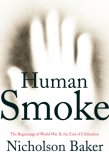Over the last few days, I’ve raced through Nicholson Baker’s Human Smoke: The Beginnings of World War Ⅱ, the End of Civilization.
The book is a collection of vignettes — some only a paragraph long, few longer than a page — of episodes from the years leading up to the second World War, and then from the years of the war itself up through . Baker mostly leaves his own voice out of it, except for a few paragraphs of “afterword” at the end.
The book generated a lot of heat when it was released a few months ago because it challenges the idea that World War Ⅱ was a “good” war, something that is today an article of faith for all decent civilized people.
World War Ⅱ is so revered these days, with all of the “greatest generation” foofaraw, politicians trying to get themselves compared to Churchill, and the like, that people have come to have a weird nostalgia for the period as if it were the high point of civilization, when in fact it was very much the opposite.
The greatest generation gave us the greatest failure of civilization the world has ever seen, resulting in the deaths of millions, the development of the technology of genocide, the normalization of a military policy of barbarity towards civilians, and ending with a gargantuan communist terror-state crushing much of Europe and Asia and, along with the United States, threatening the world with nuclear annihilation.
The only thing that might have been worse would have been if the Axis powers had won. Ay, there’s the rub. And that sentiment has been the quick and potent retort to anyone who questions the article of faith.
Baker isn’t satisfied with this: “My feelings about the war change every day. But I also feel that there is a way of looking at the war and the Holocaust that is truer and sadder and stranger than the received version.”
The defenders of the received version were quick to respond. In the New York Times, a reviewer said:
But in fact, with few exceptions, the prisoners of Belsen, Dachau, and Buchenwald were not liberated by the war — they were murdered during the course of it. And Baker does suggest, in many places in the book, how many opportunities to aid and rescue Jewish refugees and “untold millions” of suffering Europeans, were squandered — indeed, actively discouraged or forbidden — by the Allies in pursuit of their war aims or other policies.
Much of the criticism of Baker’s book is similarly knee-jerk. Some borders on paranoid — ascribing to Baker opinions and assertions that he never explicitly makes, but finding them implicit in his constellation of vignettes. Baker invites this sort of thing by muting his own voice and leaving the interpretation of his examples (and his choices of what examples to include) to the reader. I think Baker probably deliberately chose to suggest controversial things in this way that he felt afraid to or unable to defend explicitly, which is too bad, but his critics see this as a license to invent straw man arguments to attack, which is also too bad. Someone called the book “a 500-page Rorschach Test,” which hits the nail on the head.
The callousness to the plight of Jewish refugees is one of the themes of the selections Baker chose. Other themes that receive prominent play include:
- the evolution of the policy of attacks on the civilian population, particularly by the Allies — largely aerial bombardments, but also chemical & biological warfare and starvation blockades
- that these attacks on the civilian population, sold as a method for demoralizing and weakening the enemy, most frequently did just the opposite, and served mainly to slake a thirst for bloody revenge on the part of the attackers
- the efforts of various pacifist groups to encourage negotiation, inoculate against war fever, and assist refugees and other war victims
- the evolution of the “final solution” as the war escalated, with the implication (I think) that the Nazis became more savage toward their victims the more they themselves felt the savagery of the war
- the surprising (to me) extent to which the United States was engaging in war against the Axis powers prior to the Pearl Harbor attack and the formal declaration of war
The book is a powerful, captivating, relentless read. It has flaws — Baker’s aforementioned editorial stand-offishness; an unseemly amount of naïveté, particularly when it comes to being shocked and surprised (or worse, credulous) at politicians’ hypocritical platitudes or at the commonplace racism of the period; and a largely United States-centric view of the war. Still, it’s an eye-opener, and a good remedy for anyone who’s had a poisonous dose of History Channel.

